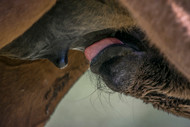Mother's Milk - Everything You Need To Know About Colostrum
Posted by Scone Equine Hospital on 2nd Apr 2019
‘There is nothing better than Mother’s Milk’, but why is this first milk known as colostrum so important to our newborn foals?
What is colostrum?
Colostrum is the thick, sticky, yellow-white fluid produced by the mare’s udder. It is highly nutritious, having higher levels of protein, fat, vitamins, sugars & minerals than regular milk. The most important contents of the colostrum are the maternal immunoglobulins. Immunoglobulins are building blocks of proteins used by the body’s immune system to fight off infections. The mare selectively concentrates these building blocks of immunoglobulins from her blood into her milk during the last few weeks of pregnancy.
Why do foals need to have colostrum?
Unlike in some other species, immunoglobulins are not transferred from the mare to the foal during pregnancy. This means that when foals are born they are extremely susceptible to infections caused by bacteria or viruses found in the environment. This ‘maternal immunity’ (immunity from the mother) lasts 6 - 12 weeks at which stage the foals own immune system should be functioning and producing its own protection. Without ingestion of sufficient quantity or quality of colostrum (failure of passive transfer) the foal is at risk of developing life-threatening conditions.
How is colostrum absorbed by the foal?
Normal newborn foals should stand and nurse within 1-2 hours after birth. For a short time after birth, a newborn foal is able to absorb the large immunoglobulin proteins across the small intestinal wall and into the bloodstream. The absorption of colostral immunoglobulins is greatest during the first 6-8 hours after birth. After 24hours, absorption of immunoglobulins across the intestinal wall is no longer possible due to changes in the intestine. Concentrations of immunoglobulins in the colostrum also rapidly decline after the first 24 hours. The foal should ingest approximately 2-4 litres of good quality colostrum to provide sufficient levels of immunoglobulins in the foal’s bloodstream to fight off infection.
How do we evaluate the quality of colostrum?
Colostrum can be assessed subjectively by evaluating its appearance. Good quality colostrum should be thick, yellow in colour and have a sticky texture. Poor quality colostrum is typically white and watery. Colostrum can also be measured objectively and more accurately using a colostrometer or refractometer (Brix or alcohol). Typically sugar (Brix) refractometers allow easy and precise assessment of colostrum quality on-farm. Good quality colostrums ≥ 20% with the sugar (Brix) refractometer.
What is an IgG test and what is involved?
An IgG test is typically performed when the foal is 12-24 hours old. A sample of blood is collected and the level of immunoglobulins that the foal has absorbed is determined. An IgG test is critical to determine whether the transfer of maternal immunoglobulins to the foal has been successful. An IgG result of >800mg/dL indicates that there has been adequate transfer. An IgG result of 400-800mg/dL indicates a “Partial Failure of Passive Transfer” and <400mg/dL is referred to as “Failure of Passive Transfer”. This indicates that IgG levels are inadequate to protect the foal and supplementation of IgG is required.
There are a number of different IgG tests that can be performed – either on farm or by your veterinarian. It is advised to have your veterinarian assess your newborn foal within the first 24 hours post birth for a foal health check and IgG test.
What happens if there is Failure of Passive Transfer (FPT)?
There are several reasons why a foal may not absorb adequate IgG. The most common causes of FPT include loss of colostrum prior to foaling (mares “running milk”), failure of the mare to produce adequate quantities of good-quality colostrum, failure of the foal to ingest an adequate amount of colostrum in the first 12 hours or failure to absorb the colostrum.
Foals with FPT are at extremely high risk of developing life-threatening infections (typically umbilical, lung, gastrointestinal, bone, joint or multiple sites). If a foal is diagnosed with FPT at 24 hours of age, your veterinarian will offer the option of transfusing plasma intravenously to increase the IgG level in the foal. A second IgG test will be performed after the transfusion to confirm the foal’s IgG levels are adequate.
It is important to remember that foals with FPT may not show any clinical signs of illness in the early neonatal period, but are at significant risk of developing illness. An IgG test is critical to identify the problem while there is time to intervene and reduce the risk of the foal developing a serious illness.
In Summary
It is vitally important that your newborn foal ingests an adequate volume of good-quality colostrum in the first 12 hours of life for adequate transfer of maternal immunoglobulins. You can ensure your foal has received adequate immunoglobulins by having your veterinarian perform a foal health check and IgG test at 24 hours of age. This way we can ensure that your foal has the best start to a healthy life.

